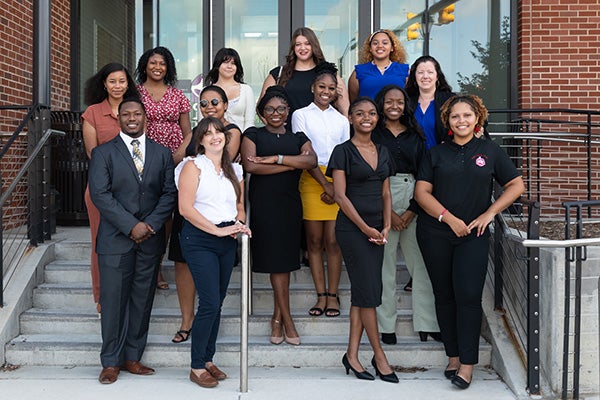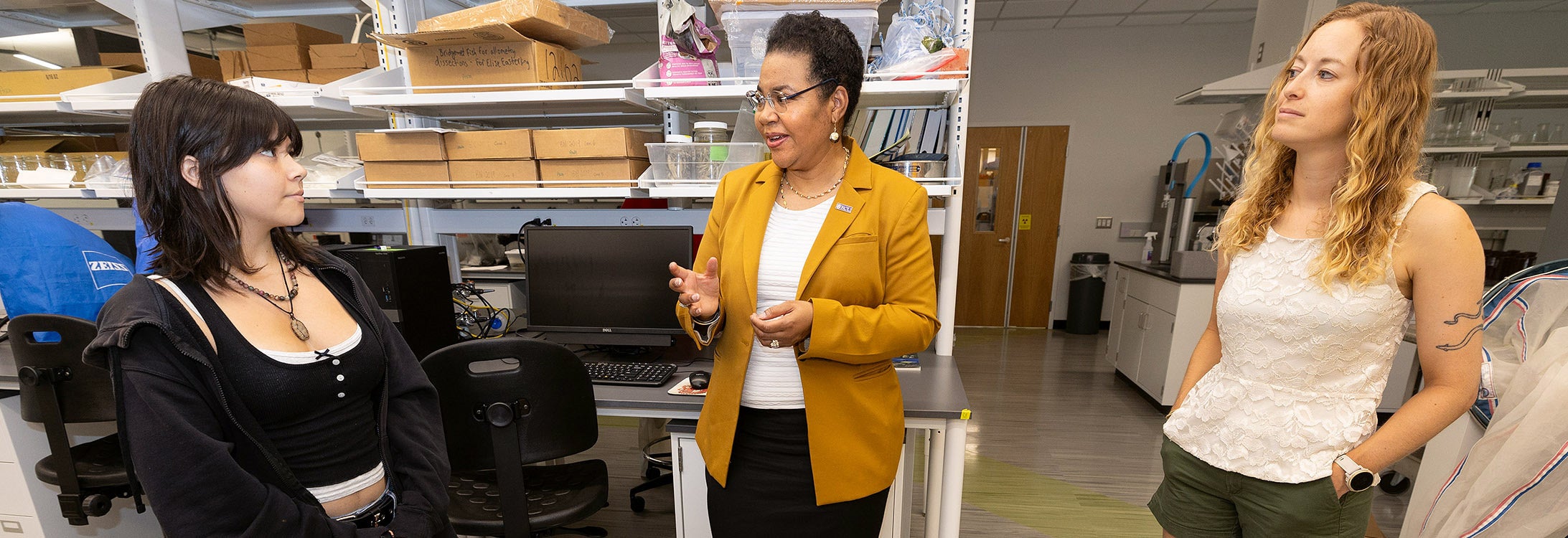BUILDING RESEARCH CONNECTIONS
STEM summer immersion program builds pathways, partnerships
Twelve students found their footing in research and scientific discovery and learned more about pathways to graduate studies at East Carolina University during the STEM Summer Immersion Program.
The program, funded by a $1.3 million North Carolina GlaxoSmithKline Foundation grant, is designed to build connections between ECU and students from the state’s minority-serving institutions with a goal of establishing pathways to public health graduate education. The 2023 cohort is the first of four during the grant timeline.
“Supporting these summer immersion students and others like them with mentoring, research and opportunity is at the heart of our funding at the North Carolina GlaxoSmithKline Foundation,” said Marilyn Foote-Hudson, the organization’s executive director. “The dedication and passion of the program leaders, researchers, faculty and these budding STEM students is key to creating amazing STEM-focused careers here in North Carolina.”
The student interns, selected from 44 applicants, were matched with mentors in ECU labs, conducted fieldwork on various research projects, participated in professional development, shadowed mentors, and even connected on some fun by joining in a weekly lab croquet match. Their projects in the College of Health and Human Performance and the Thomas Harriot College of Arts and Sciences advanced research on many topics, including heat stress exposure, the secrets of bacterial biofilms, climate impacts on fisheries, and the molecular evolution of spider venom.

Twelve students, representing Chowan, Fayetteville State, North Carolina Central, UNC Pembroke and Winston-Salem State participated in the STEM Summer Immersion Program at ECU. (Contributed photo)
Provost Dr. Robin Coger visited Dr. Rebecca Ashe’s lab to see firsthand how the research activities fostered growth and provided opportunities for students and mentors. Martina Van Etten, a junior biology major at UNC Pembroke, explained a sablefish study she was conducting with her mentor, postdoctoral research scholar Dr. Kat Dale. Coger eagerly quizzed Van Etten on writing R-code — common to biology and ecology — and discussed graduate school and other future opportunities.
ECU collaboration
Coger said all the students’ contributions to research are a substantial benefit of the collaboration between ECU and the minority-serving institutions. The positive experiences the students have through the program have the potential to inspire them to pursue graduate degrees in the future, she said.
“Partnerships and investments that foster shared exchange, collaboration on cutting-edge problems and produce valued outcomes are essential to a future focused, innovation driven university,” Coger said. “I am grateful to the NC GlaxoSmithKline Foundation for investing in this program, and thankful for all of the team members whose dedication has made the program a success.
“By building mutually beneficial partnerships with other universities, ECU is ensuring that we are actively engaged in important collaborations with excellent colleagues while simultaneously involving students from multiple institutions in the research of East Carolina University,” Coger said.
Program organizers from ECU and Fayetteville State University see the first summer as an unequivocal success. Based on their metrics, the summer session offered hands-on experience and collaborative learning and fostered a vibrant and inclusive learning community.
“The students’ enthusiastic engagement with research, coupled with the dedicated mentorship they received, has resulted in impressive academic and personal growth,” said Dr. Danielle Graham, assistant professor of microbiology and interim chair of the Department of Biological and Forensic Sciences at FSU. “For students, it provided a unique opportunity to delve into hands-on research projects, fostering a deeper understanding of STEM disciplines and honing critical thinking and problem-solving skills. The experience also empowered them to consider advanced degrees and careers in STEM fields.”
All 12 of the 2023 cohort participated in an undergraduate research poster symposium at the end of their 10-week program. Each student prepared a poster to present their area of study, findings and outcomes of their research. The interns spent time each week in a journal club where they practiced science communication to help them prepare for their presentations.
Graduate scholarships
Dr. Ariane Peralta, ECU associate professor of biology, and Dr. Stephanie Richards, ECU professor of environmental health sciences, said the first summer immersion session exceeded expectations, bringing “outstanding undergraduate students” to ECU and surpassing the goals for the number of participating universities.
“We plan to build on this success and recruit students from the five participating institutions and additional North Carolina universities in future summer research programs, spreading the word about ECU’s exciting health-related research and educational opportunities,” Richards said. “It is our hope that some of these students will consider applying to ECU Graduate School in the future and help us increase the high-quality diverse student population in public health-related programs.”
Graduate school scholarships are the second major component of the project. The grant provides up to two years of full-time graduate education for eligible students. The first graduate students were selected this spring.
Each year, up to 10 students will be admitted into one of ECU’s master’s programs (public health, environmental health, health education, biology and molecular biology, and biotechnology) and will have their tuition, housing and some incidentals covered by the scholarships. ECU will also work to place students from the program into mentorship settings with public health workers in eastern North Carolina to give students real-world experience before graduation.
